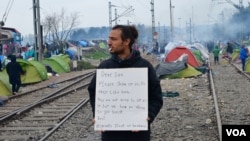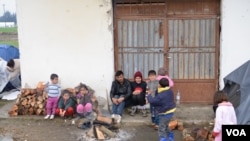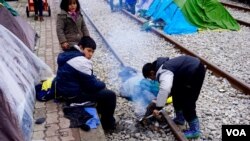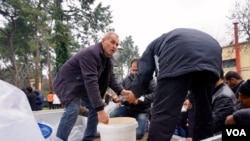He stood for hours in the middle of the train tracks crossing the northern Greek village of Idomeni, just meters from the closed Macedonian border, sometimes with a cigarette dangling from his lips. He was mute as press photographers snapped away and throngs of war refugees and migrants shuffled past, walking gingerly in their mud-caked shoes to forage for food or to try to see a doctor.
His protest was silent — the hand-written placard spoke on his behalf. “Dear Sun. Please shine on us, it’s very cold here. They are not going to let us in but we have no where to go back.”
The message sums up a collective despair taking hold at this makeshift refugee camp on the heels of a three-week standoff with Macedonians and other Balkan countries, which adamantly oppose allowing refugees to continue their journey to the prosperous north.
"We are hopeless,” says Ali, 45, a onetime clothing retailer from Syria’s southwestern city of Dara’a, located just 13 kilometers from the Jordanian border.
Two years ago, the life of Ali’s youngest son, a 16-year-old, was cut short by a sniper.
Like many Syrians now fleeing the war-torn country Ali didn’t want to make for nearby Jordan, seeing no future there, just a frustrated life in a long-term refugee camp, the kind of life Palestinians have endured for decades in camps across the region.
And so along with his wife, 12-year-old daughter, eldest son and a group of neighbors, he set off on an epic half-circle journey crossing back-and-forth through a series of rebel- and government-held battle lines across southern Syria, north through eastern Syria close to the Iraqi border, and westward through the self-styled caliphate of the Islamic State.
'In misery here'
Ali's family entered Turkey illegally near the border town of Kilis.
It took them 15 days to work their way through Syria, with several alarms and near misses on the way. Death stalked them in the form of Russian and Syrian Air Force planes, and they were fearful not only of sudden missile-delivered death, but of capture by jihadists.
“We stayed in Dara’a because we thought the war would end, but when Russia intervened, that changed everything,” Ali explains, sitting in a leaky blue tent he and his family have occupied for some 20 days. Quick to invite strangers into his tent, he offers refreshment and what little food is available, as if he were providing traditional hospitality in his own home back in Dara’a.
“The country has been destroyed — and not just the buildings. Syria is ruined; it will never recover,” says Ali, a thoughtful man with a pepper-and-salt beard and lively dark eyes.
“We arrived in Europe and hoped to start a good new life, but we find ourselves in misery here," he adds. "The one good thing to say is that at least we are not being bombed. We are stuck here, and maybe we have no chance now. Waiting on others to make decisions is killing us.”
Losing hope
Those others would be the Europeans and Turkish officials who are preparing to meet Thursday to agree on a final deal that has been denounced by the UN’s refugee chief and rights groups as a violation of international law. The deal aims to curb the refugee crisis roiling a continent that at first welcomed asylum-seekers, but has since hardened its heart amid increasing alarm over jihadists posing as refugees and mounting fears about the challenges of integration.
Like Ali, many refugees trapped for weeks on the Greek-Macedonia border are losing hope. After days of rain, conditions at the makeshift camp have worsened; some families have shifted their tents several kilometers away to escape sodden fields, while others try to plot alternative routes to Northern Europe. Many mentioned Greece’s neighbor, Albania, as a possible alternative to the recently closed Balkan routes.
The failure Monday of a mass attempt by refugees to enter Macedonia by fording a fast-running stream swollen by winter rain has added to the camp’s collective sense of defeat. Around a thousand got into Macedonia but most were sent back by border guards. The trespassers claimed they were roughed up by the Macedonians.
Greek police estimates indicate that camp populations may have decreased to 10,500 from an estimated 13,000. Babar Baloch, a UNHCR spokesman, told VOA he isn't sure whether those numbers are accurate and that some families have spread out to nearby villages.
That can be seen at a glance along the E75 highway, where more tents have appeared by the roadside. Additions have been made to a makeshift refugee camp at a gas station about 15 kilometers outside Idomeni.
“If you look at the conditions here, it is just not livable,” Baloch told VOA. “The refugees are really struggling now. They are up against the rain and cold weather, mud and water-logged fields. You can see some refugee children barefoot, others just in sandals or flip-flops. It is a heartbreaking story all around. The humanitarian problems are increasing. More children are being hospitalized.”
He agrees it would be better for refugees to move to proper camps, but that impediments are rife. “Many of the refugees don’t want to move; they want to stay close to the border," he says. "And the Greek authorities need to improve the camps that are available and to come up with new sites, which could be developed quickly to take the refugees from here."
Like the refugees, Baloch does not have high hopes for Thursday’s meeting between EU and Turkish leaders, which could lead to a deal whereby the EU will resettle one refugee from Turkey in return for every refugee Turkey takes back from Greece. “We hope the European leaders understand the humanitarian situation is deteriorating rapidly at this border site," he says. "They need to wake up to the reality that Greece is struggling.”
So, too, are the refugees. Frustration are already boiling over more than they did last week, when local Greeks arrived in pick-up trucks to provide free food and clothing. Behind Idomeni’s railway station Wednesday, as refugees snatched at the offered food and donated clothes, brawls almost broke out and were preempted only by a handful of Syrian men, who urged everyone to calm down and queue.








